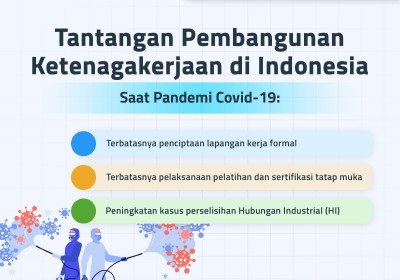Challenges to Labor Development in Indonesia
September 10, 2021
JAKARTA – Prior to the Covid-19 pandemic, the state of the Indonesian workforce and employment faced a slew of global challenges that forced them to respond to employment megatrends of the future. The inevitable change in the form of work is triggered, among others, by technological revolution, demographic changes, skill revolution, cultural changes and climate change.
Challenges facing employment development in Indonesia include tackling issues regarding the low quality of the Indonesian workforce, indicated by the fact that only 54.66% of workers only have a junior high school (or lower) level education. Also, digitalization has proven to shift the industry's needs for the types of skills and flexibility needed from its workers. Finally, the Covid-19 pandemic and the government's resulting restrictions on movement and social distancing has resulted in an economic contraction, thereby making employment opportunities scarcer.
By February 2021, the impact of the Covid-19 pandemic is still being felt by around 19.1 million Indonesians. This condition has resulted in the decrease of worker wage rates. Also, the scarcity of jobs due to the pandemic has pushed the unemployment rate higher for young workers and vocational school (SMK) graduates.
Aside from economic contraction, the pandemic has also impacted face-to-face training and certification programs. Only 59,149 people were trained as part of vocational training at 13 ministries and government institutions between January and June 2021.
Meanwhile, the implementation of competency certification is relatively less affected because a remote assessment mechanism is still being implemented due to the pandemic's social distancing rules. Only 345,468 people were newly certified as workers from these training programs by June 2021.
The challenges faced in efforts to improve and harmonize industrial relations include the fact that the number of industrial relations disputes in 2020 rose to 8,714 cases, compared to only 1,586 cases in 2019.
These disputes were dominated by situations regarding the 7,262 layoffs that took place within these ministries due to declining economic conditions because of the government's social distancing measures preventing economic activity.
In the first semester of 2021, the number of dispute cases reached 528.
Indonesia’s Research Institutions Supporting the Development of the Electric Vehicle Industry
Indonesian Muslim Fashion and Cosmetics IKMs Shine at Dubai World Expo 2020
Govt Steps Up UMKM Transformation Efforts in the Midst of Pandemic Slowdown
Govt Encourages Promotion of IKM Products in Digital Era
Government Begins Developing Maritime Training Center in Makassar
Tweets by IDDevForum
